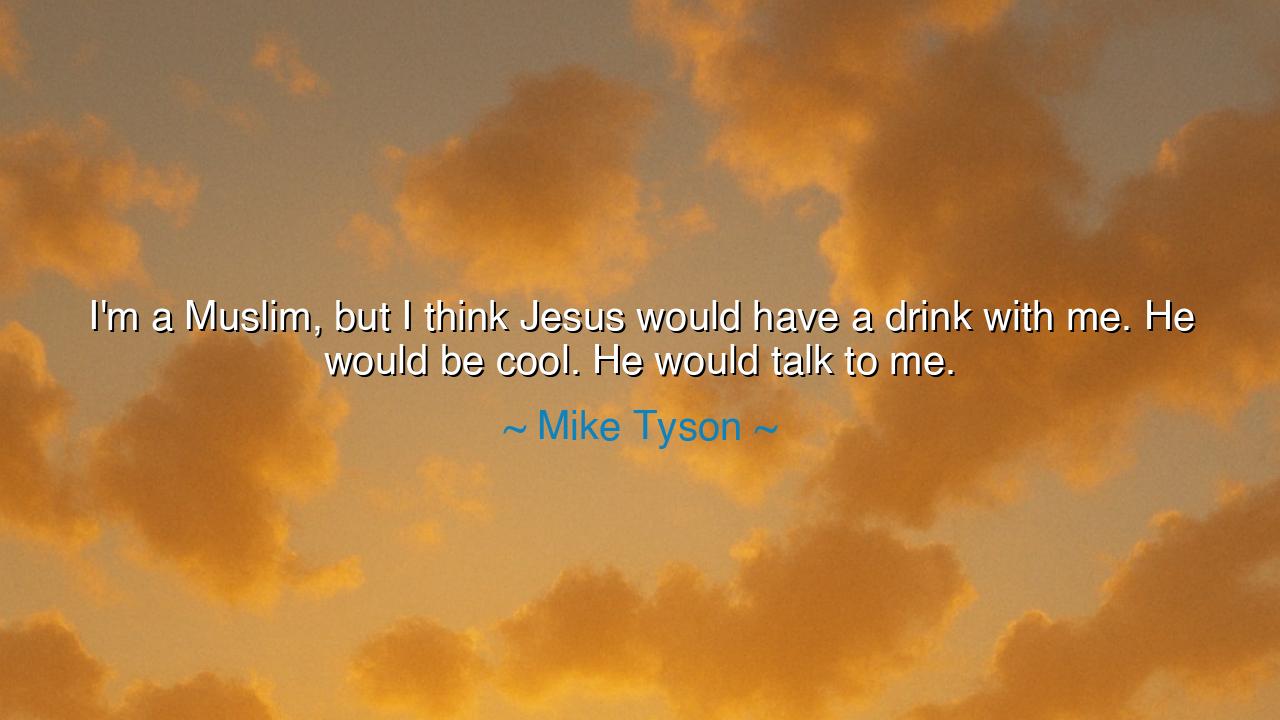
I'm a Muslim, but I think Jesus would have a drink with me. He
I'm a Muslim, but I think Jesus would have a drink with me. He would be cool. He would talk to me.






Hear now, O seekers of wisdom, for the words of Mike Tyson, a man who has known both the heights of glory and the depths of struggle, carry a powerful message for all who seek understanding. He said—"I'm a Muslim, but I think Jesus would have a drink with me. He would be cool. He would talk to me." In these words, Tyson speaks not only of his personal journey but of a universal truth that transcends the boundaries of religion, belief, and human connection. Tyson's words reflect a profound understanding that at the heart of all great faiths is compassion, understanding, and love.
What is it that Tyson is saying here? He speaks of Jesus, a figure known to many as a symbol of love, acceptance, and forgiveness, and he imagines a connection between them that is not bound by religious walls, but by the universal human spirit. Tyson, a Muslim by faith, envisions a conversation with Jesus, not as a distant figure of divinity, but as a companion and a friend. In his words, there is a message that faith is not a division, but a bridge that connects us all. No matter the labels we wear, we are all bound by the same deep, shared humanity.
Consider the story of the great Saint Francis of Assisi, who, despite the deep divides of his time, reached across the walls of religion, seeking unity and peace. Francis was a Catholic monk, yet his heart extended beyond the borders of his faith, seeking to embrace all people, regardless of their beliefs. He found the divine not in exclusion, but in inclusion, in the recognition that all beings, regardless of their differences, carry the spark of divinity within them. Jesus, in his own time, did not sit in judgment of those who were different but reached out to the outcasts, the sinners, the tax collectors, and the downtrodden. His message was of love, of meeting others where they are, regardless of their faith, their past, or their station in life.
In much the same way, Tyson's words echo this truth. The essence of Jesus’ teachings was not about rigid boundaries or divisions, but about connection, forgiveness, and understanding. Jesus would have a drink with Tyson not because he agrees with every action, but because he sees the human soul behind the mistakes and the triumphs, behind the masks we wear. Jesus, in his infinite compassion, would not turn away from Tyson, but would sit beside him, knowing that every soul has the capacity for growth, for redemption, and for love.
Let us look to the example of Muhammad, who, in his life, sought to build bridges of understanding across cultures, races, and religions. As a Muslim, Tyson, too, embodies this spirit of connection, knowing that his faith is not about division, but about spiritual unity with all people. Muhammad taught that the ultimate goal of faith is to connect with God through acts of compassion, mercy, and love. He reached across the boundaries of tribes, seeking peace and understanding, and saw in others the divine potential that lay hidden within them. Tyson's words reflect this same spirit—one of openness, of reaching out to others, regardless of their backgrounds.
And so, O seekers of wisdom, the lesson is clear: let us not be bound by the walls that separate us, but let us embrace the universal truths that unite us. Tyson's vision of sitting with Jesus is not just a personal reflection, but a universal truth about acceptance, forgiveness, and understanding. We are all human, and our differences, whether in faith, culture, or background, are not obstacles but opportunities to connect, to share, and to learn from one another. Jesus would sit with us all, not because we are perfect, but because he sees the potential for goodness in each of us. Let us follow his example, not by isolating ourselves in our beliefs, but by extending the hand of love, compassion, and understanding to all who walk this earth with us.
So, O children of the earth, let us walk together, not with judgment or fear, but with open hearts, ready to listen, ready to understand, and ready to love. Faith is not a boundary; it is a bridge—a bridge that unites us, that allows us to sit together, to share, and to grow in the knowledge that, in the end, we are all bound by the same deep human need for connection. May we be like Jesus, and may we, too, offer compassion and understanding to all, regardless of where they come from or what they believe.






AAdministratorAdministrator
Welcome, honored guests. Please leave a comment, we will respond soon